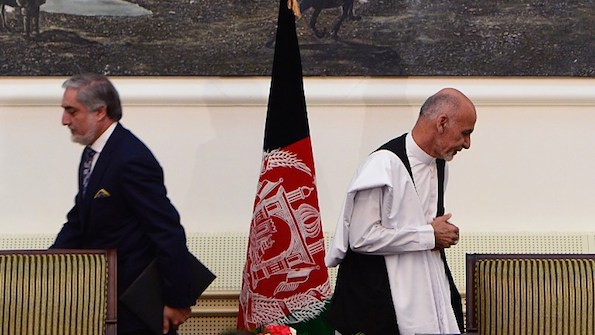Iran's president urges US to focus on terror threat instead of fears his country wants nukes Published September 24, 2014 The Associated Press
 |
| Iran President Hassan Rouhani speaks during his keynote address at New America, a public policy institute and think tank, on Wednesday, Sept. 24, 2014 in New York. (AP Photo/Bebeto Matthews) |
 |
| Iran's President Hassan Rouhani, looks at a protester holding a picture who interrupted while he was speaking at New America, a public policy institute and think tank, on Wednesday, Sept. 24, 2014 in New York. Protesters say the individuals in the picture are all dissidents under house arrest in Iran and called on the President Rouhani to facilitate their release. (AP Photo/Bebeto Matthews) |
NEW YORK – Iranian President Hasan Rouhani urged the United States on Wednesday to move beyond "insignificant" fears that his country seeks nuclear arms and challenged it to join his country in battling what he described as the global threat of Islamic extremism.
Rouhani also made clear he was not prepared to interfere in the case of Jason Rezarian, an American-Iranian journalist detained on unspecified charges in Iran, during a speech and question-and-answer session hosted by the New America think tank.
But most of his comments focused on the menace posed by the Islamic State terror group and attempts by his country and the U.S. to seal a deal to meet White House demands that Iran agree to significant long-term curbs on its nuclear program that could be used to make weapons in exchange for an end to crippling sanctions.
The Iranian president is addressing the U.N. General Assembly on Thursday, and his comments Wednesday touched on some of the issues he is likely to highlight.
The nuclear talks appear stuck two months before their extended Nov. 24 deadline. While the U.S. is formally joined by five other powers at the negotiating table with Iran, it is clear that the Americans are the lead negotiators, and Rouhani directed most of his comments at Washington.
He urged the U.S. government to "let go of pressure politics toward Iran" — a reference to Iranian complaints that Washington's demands at the talks are unrealistic. Repeating that Iran is not interested in nuclear arms, he urged the U.S. to "leave behind (this) insignificant issue."
Instead, Rouhani said, the two countries must focus on the fight against the Islamic State group and other extremist groups, the "real and serious common challenges which ... threaten the entirety of the world."
At the same time, he was critical of the U.S. bombing campaign of Islamic Group strongholds in Iraq and Syria and the growing coalition of countries seeking to stop the extremists by military means. "Bombing and airstrikes are not the appropriate way," he said, warning that "extraterritorial interference ... in fact only feeds and strengthens terrorism."
Blaming "the misunderstandings of the realities of the region by ... outsiders," Rouhani said wrong U.S. policies, including the invasions of Afghanistan in 2001 and Iraq in 2003, likely led to the birth of the Islamic State group by creating power vacuums exploited by the extremists.
He also suggested it was in the West's interest to reach a nuclear agreement with Iran, freeing Tehran to play a more active role in creating and maintaining stability in the Islamic world.
Even if a nuclear deal is sealed, it could face harsh opposition by Iranian hardliners and U.S. congressional critics united in one fear — that their side has given away too much. But Rouhani shrugged off opposition from inside his country and said it was up to President Barack Obama to deal with Congress.
Iran-U.S. tensions have eased since the election last year of the moderate Rouhani. A year ago, he and Obama spoke by telephone for 15 minutes, the first time the presidents of the United States and Iran had talked directly since the 1979 Iranian revolution and siege of the American embassy. The conversation was hailed as an historic breakthrough.
But American officials are furious with Iran for detaining Rezarian, a Washington Post journalist who has both American and Iranian citizenship, as well as his wife.
Iranian officials have not specifically said why the couple is being held, and Rouhani has dodged questions about their fate. Asked Wednesday about Rezarian, he said he would be freed if he is innocent of any crime.
"We must not prematurely express opinions about a case that hasn't reached the court yet," he said.

Karzai092414.jpg?ve=1&tl=1)






